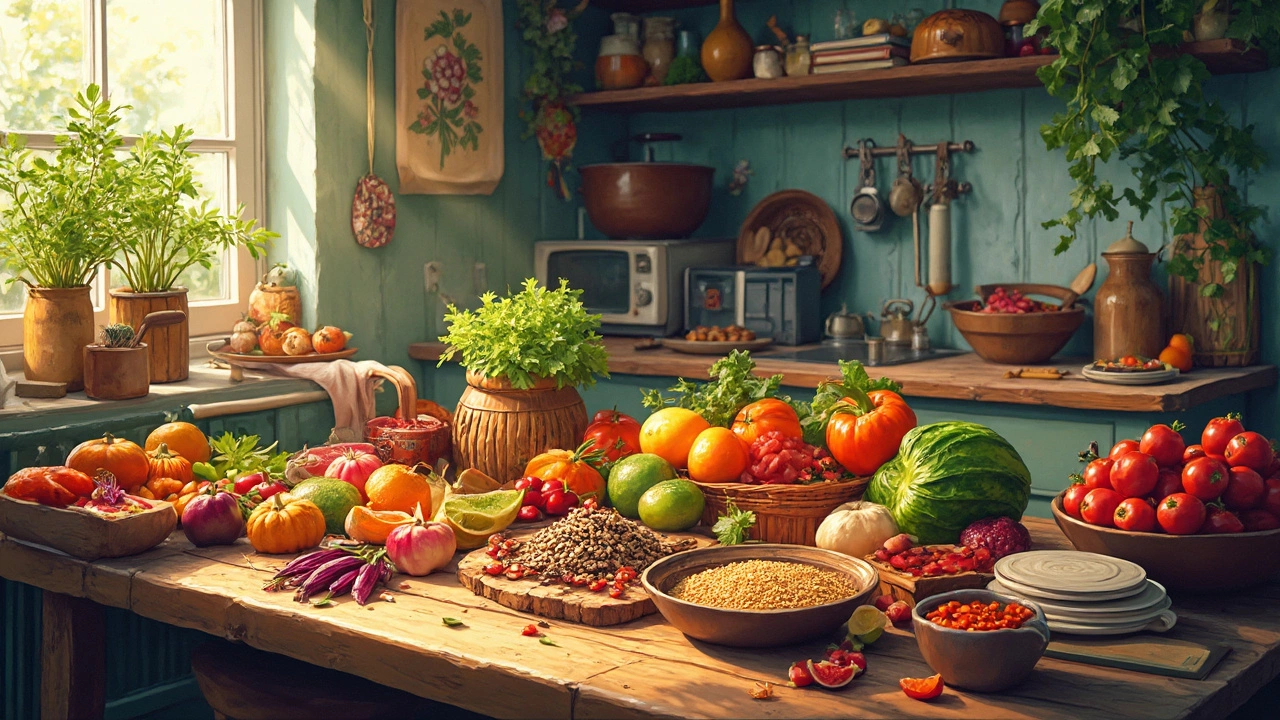So, you're curious about what it means for food to be 100% vegan? It's all about sticking to plant-based ingredients, meaning no trace of animal products like meat, dairy, eggs, or honey. Think fresh bounty like fruits, veggies, grains, nuts, and legumes.
Now, let's break it down. You've got your fresh fruits, a rainbow of benefits packed into every apple, banana, or berry. Vegetables? They're not just good for you; they're vibrant and diverse in flavors and uses. Grains like quinoa and rice? They're your versatile staples. Let's not forget nuts and seeds for your healthy fats and protein boost.
But there's a surprise element too. Did you know that some chocolate and even certain wines can be vegan? Yep, it's not all salads and tofu. With a little bit of label reading and research, you might find more vegan-friendly products than expected.
- Understanding Vegan Basics
- Naturally Vegan Foods
- Surprisingly Vegan Products
- Balancing a Vegan Diet
- Tips for Vegan Cooking
Understanding Vegan Basics
So, let's start with the essentials. Going vegan isn't just about ditching meat. It means completely crossing off any animal-derived ingredients in your shopping list. This includes obvious things like chicken and beef but also sneaky ones like gelatin, which is often found in candies and desserts.
The idea is to stick solely with plant-based foods. This translates into relying on fruits, vegetables, grains, nuts, and seeds. Not only are these the basis of a vegan horizon, but they're also loaded with nutrients that help keep your body running smoothly.
Why Vegan?
People choose a vegan lifestyle for various reasons. Some go vegan for animal rights, swearing off participation in industries that exploit animals. Others focus on personal health benefits, considering that plant-based diets are often linked to lower risks of heart disease, high blood pressure, and certain types of cancer.
Nutritional Considerations
It's crucial to be aware of nutritional needs when going vegan. You’ll want a plan to get enough protein, iron, and B12, which are usually covered by animal products. Lentils, chickpeas, and quinoa are great sources of plant-based protein.
| Common Nutrient | Vegan Source |
|---|---|
| Protein | Lentils, Tempeh |
| Iron | Spinach, Tofu |
| B12 | Fortified cereals, Nutritional yeast |
Incorporating these into your meals can help maintain a balanced vegan diet without complications. Plus, these foods are versatile and can be blended into loads of delicious recipes.
Understanding these basics helps you navigate through the myriad of delicious options available in a vegan lifestyle.
Naturally Vegan Foods
When you're diving into the world of vegan foods, you're looking at the pure essence of what nature offers without any animal involvement. It's fascinating how diverse and abundant plant-based ingredients really are.
First off, let's chat about the basics: fruits and vegetables. They are the foundation of a vegan diet, bringing not just flavors but a truckload of vitamins and minerals. You can't go wrong with a juicy apple or a colorful medley of bell peppers – all packed with nutrients and easy to find in any grocery store.
Grains and Legumes
Next up, grains like rice, quinoa, and oats are superstar staples for meal prep. These are naturally vegan and crucial for energy. Then there are legumes - think beans, lentils, chickpeas. These guys are your go-to for plant protein without having to worry about missing out on essential amino acids.
"Beans and grains together make a complete protein, essential for maintaining a balanced vegan diet," says Dr. Susan Levin from the Physicians Committee for Responsible Medicine.
Nuts and Seeds
Need a snack or a salad topper? Nuts and seeds like almonds, walnuts, chia, and flaxseeds fit the bill. These little powerhouses provide healthy fats and protein and can be used in countless ways – toast them, grind them, or just eat them raw.
Herbs and Spices
Don't underestimate herbs and spices. They're the unsung heroes that turn a plain dish into a culinary delight. From basil to coriander, these are all about flavor without any animal products. And yes, they're naturally vegan! This is where a bit of experimenting can really pay off.
If you're wondering how these all stack up nutritionally, here's a simple breakdown:
| Food Group | Main Nutrients |
|---|---|
| Fruits & Vegetables | Vitamins, Fiber |
| Grains | Carbohydrates, Protein |
| Legumes | Protein, Iron |
| Nuts & Seeds | Healthy Fats, Magnesium |
The beauty of sticking to naturally vegan foods is the variety and the ease. You won't be stressing about what to swap out or how to substitute demands of a recipe. In many cases, these whole foods shine brighter as they are.

Surprisingly Vegan Products
Let’s talk about those unexpected heroes in your kitchen that are totally suitable for a vegan diet. You know, those foods you thought were off-limits are actually good to go!
Accidentally Vegan Snacks
Ever grabbed a bag of Oreos thinking they'd be full of dairy, only to find out they're actually vegan? Yup, the classic cookie is made without animal products. Pretty sweet, right?
Another snack that might surprise you is Ritz Crackers. Their buttery taste has zero butter, making them a perfect vegan-friendly bite.
Vegan Condiments
Let's step into the condiment section for a minute. Sriracha, the spicy sauce everyone loves to sprinkle over dishes, doesn’t contain any animal derivatives. It’s an easy way to kick up the flavor without stepping off the vegan trail.
Even conventional mustard and ketchup often find themselves on the vegan safe list. Just remember, always double-check those labels since ingredients can vary.
Beverages You Can Sip On
Wine lovers might be intrigued to know that while a lot of wines are filtered using animal products, there are many that aren't. Look for wines marked as 'unfined' or 'unfiltered', or better yet, those labeled 'vegan'.
If you're more of a soda drinker, rejoice! Soft drinks often come without any animal-derived ingredients, including your classic colas.
Chocolates and Candies
It's a common myth that chocolate can't be vegan. Dark chocolate with a cocoa content above 70% tends to be dairy-free and entirely vegan. Some gummy candies, usually the fruit-flavored ones, also fall in line as long as they skip on the gelatine.
| Product | Description |
|---|---|
| Oreos | Vegan cookies, no dairy involved. |
| Sriracha | Spicy sauce without animal products. |
| Dark Chocolate | Choose 70% cocoa for a tasty vegan treat. |
| Ritz Crackers | Buttery crackers that surprisingly contain zero butter. |
So now you see, many familiar items can fit right into your plant-based lifestyle without any compromise on flavors. Keep exploring, you might just find more surprising additions to your vegan kitchen!
Balancing a Vegan Diet
Eating a vegan diet doesn't mean sacrificing nutrition. It's all about making sure you get the right balance of nutrients from those plant-based foods. Let's get into how you can keep things balanced and nourish your body entirely without animal products.
Get Your Protein
First up, protein. While you won't be getting it from animals, there's no shortage in the vegan world. Explore options like lentils, chickpeas, tofu, and tempeh. These are not just vegan ingredients; they're protein powerhouses you can use in a variety of dishes.
- Chickpeas: Great in stews or roasted as snacks.
- Tofu: Perfect for stir-frying, baking, or even grilling.
- Lentils: Awesome in soups, salads, or even burgers.
Don't Forget Your B12
Vitamin B12 is a bit elusive on a vegan diet. Since it's typically found in animal products, you'll want to look at fortified cereals, plant milks, or consider a supplement to keep your levels up. It's super important for nerve function and red blood cells.
Essential Vitamins and Minerals
Calcium, iron, and omega-3 fatty acids are crucial too. Grab your calcium from fortified plant-based milks or leafy greens like kale. For iron, lentils, beans, and fortified cereals work wonders. As for omega-3s, flaxseeds and chia seeds are your friends. Consider these as essentials for a balanced vegan diet.
Variety Is Key
Mix it up! Try a diverse range of fruits, veggies, grains, and legumes. This doesn't just keep meals interesting but also ensures you're covering all the nutritional bases.
Planning Makes a Difference
A little planning goes a long way. Consider preparing meals ahead of time or mapping out a week's worth of meals. This ensures you're not just eating the same thing every day, and it makes it easier to keep tabs on your dietary requirements. It’s a great way to stick to your vegan foods smoothly.

Tips for Vegan Cooking
Thinking about diving into the world of vegan cooking? You're in for a treat! Not only can a vegan diet be healthy, but it can also be incredibly delicious and satisfying. Here are some tips to make your plant-based culinary adventures both fun and practical.
Stock Up on Staples
First things first, keep your pantry stocked with essentials. Think whole grains like brown rice, quinoa, and oats. Lentils and beans are your protein-packed friends, and don't forget a variety of nuts and seeds for that extra crunch and nutrition.
Experiment with Flavors
Using herbs and spices is key to adding depth to your dishes. Go bold with cumin, turmeric, or smoked paprika. Fresh herbs like basil, cilantro, or mint can elevate any simple dish to something special. Don't be afraid to mix things up and create your own spice blends.
Master the Art of Substitution
Want to make a creamy sauce without dairy? Try blended cashews or coconut milk. Baking without eggs? Flaxseeds or chia seeds mixed with water make great replacements. For a cheesy flavor, nutritional yeast is a game-changer.
Batch Cook Like a Pro
Life gets busy, and having meals ready to go can be a lifesaver. Try cooking a big pot of chili or soup that will last you several meals. Cook batches of grains or roast vegetables at the start of the week to use in various dishes.
Don't Forget Variety
Mixing up your meals not only keeps things interesting but ensures you're getting an array of nutrients. Rotate between different vegan foods like tempeh, tofu, and various legumes to keep your diet balanced.
| Common Vegan Substitutes | Replacement |
|---|---|
| Milk | Almond/Soy/Oat Milk |
| Eggs | Flax/Chia Seeds |
| Cheese | Nutritional Yeast |
Ultimately, vegan cooking is all about creativity and exploration. Try new recipes, adapt old favorites, and most importantly, enjoy the process. You'll discover that a plant-based kitchen can be full of exciting possibilities!

